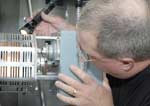Electrical short sparks class cancelations in Matthews Hall

Mike Fox, mechanical maintenance supervisor, inspects the dimmer switch that short-circuited in Cornell Auditorium Sept. 28 causing fire alarms to go off.
Night classes in Matthews Hall were interrupted and later canceled Sept. 28 due to a faulty dimmer switch.
The switch overheated in a closet in Cornell Auditorium at 7:49 p.m. No one was in the auditorium at the time, but the silent fire alarm went off after smoke escaped beside the closet by the screen, moving into the rest of the hall.
“The room had quite a bit of smoke in it,” said Bob Harrington, director of the physical plant.
Robert Frossard, public safety officer, was the second person to arrive on the scene after a custodian pulled the hand-unit fire alarm to alert the rest of the building to evacuate.
However, Frossard said the students did not evacuate upon the alarm and only evacuated the building after he came to the classrooms.
“A lot of these are evening classes,” Frossard said. “People are not familiar with the alarm system or the routine.”
He said the evening classes are not as prepared as day classes because drills focus on times when there are the largest populations of students in a particular building.
After Frossard came to the classes, the building was evacuated within five minutes.
The Joplin Police Department and Fire Department arrived at the scene soon after the students started leaving the building.
Harrington said there was no way to prevent the incident because one never knows when an electrical short will happen.
The dimmer was later removed, and classes were canceled due to the smoke dissipating through the building.
The auditorium was available for use, minus dimmers, the next day.
In such cases of alarm, public safety officers go through a routine to make sure everything is taken care of.
The first step is to secure the scene and assess the situation.
Then, the proper personnel are contacted as the building is cleared. Finally, the source of the alarm is located and secured.
Tim Woodward, fire marshal with the JFD, said the incident was reported as an electrical short.
“There was no fire, but smoke was generated,” he said.
Woodward was not at the scene, but he had advice for anyone who finds him or herself in such a situation.
“One thing, students and teachers need to understand is that they should exit the building and remain outside until the fire department determines the validity of the alarm,” Woodward said.
He said it is unfortunate that people did not recognize the alarm, but he said it does happen, and it is not the fault of the fire department.
Your donation will support the student journalists of Missouri Southern State University. Your contribution will allow us to purchase equipment and cover our annual website hosting costs.



























